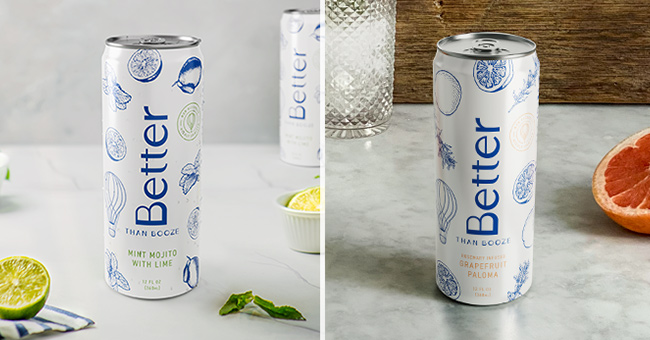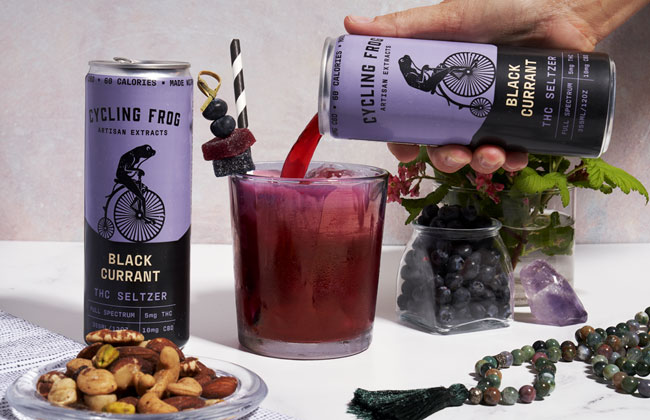
Call it the Minnesota Effect.
Earlier this summer, legislators in the North Star State opened the market for the legal sale of drinks and edibles with up to 5mg of hemp-derived THC, setting off a flurry of new product launches and business activity from local beverage makers.
While that news may have stolen the headlines, its origins lie within the 2018 Farm Bill which legalized hemp and defined it as any part of the cannabis plant that contains less than 0.3% THC in dry weight. In effect, this means that as long as hemp is used as the source material, processors are free to extract as much CBD, THC or other available cannabinoids as they want, and create legally compliant products at any dosage level that can be shipped nationwide.
This includes the two most common forms of THC: delta-9 THC, the psychoactive ingredient most commonly associated with marijuana, and delta-8 THC, a synthetic variation of the cannabinoid that is created by converting CBD and which has milder effects. Because hemp contains extremely low levels of delta-9 THC, thus requiring large amounts of hemp in order to stay under the 0.3% dry weight threshold, delta-8 THC is a more economic choice for many brands.
The federal measure has opened a variety of sales opportunities for brands reliant on hemp-extracted psychoactive components that exist outside of state regulations. Even in states where cannabis beverages are available at adult-use dispensaries, the loophole means hemp-derived THC/CBD drinks can exist outside of those networks. But for those more conservative areas of the country that have remained closed off to recreational cannabis, pioneering drink brands are likely to have an even bigger influence on cautious but curious first-time consumers. The first legal THC product they buy might not be at a dispensary, in other words, but at a bar or a liquor store.
Take Texas, where Houston-based 8th Wonder Brewery and Distillery‘s initial move into hemp-derived beverages was sparked by a pandemic-induced five month closure. Looking to pivot towards new opportunities, 8th Wonder’s Ryan Soroka connected with Bayou City Hemp Company, a full-service hemp processor that had already been dipping its toes into drinks via two branded products: Mixer Elixir and Third Coast Blend Seltzers. The two companies teamed up to collaborate on a pair of non-alcoholic sparkling waters under the name Wonder Water — one with 10mg of Delta-8 THC and one with 25mg CBD — selling 6-packs of 12 oz. cans from its downtown taproom. Starting with low-dose drinks was a priority in a conservative state like Texas, Soroka noted, and aligned with 8th Wonder’s approach towards brewing relatively low-alcohol beers.
But most importantly, Wonder Water can be sold via established distributors virtually anywhere, from CBD retailers and vape shops to c-stores and bars and restaurants. The product is currently in “several dozen” stores in the Houston area, according to the brand. That variety has been crucial in expanding Wonder Water’s audience, while its presence in well-known local landmarks and specialty retailers — West Alabama Ice House, Danny Speedo’s, Flying Saucer and Bellaire Bodega among them — has helped ease new consumers into CBD and THC for the first time.
“I think what we’re doing is trailblazing here in Texas and people are looking to Minnesota now and you know these brands and regulated states are seeing that really there are other sales channels and the opportunity outside of dispensaries is enormous,” Soroka said. “We’re talking to these big cannabis operators in California and Michigan and when we explained to them the opportunity here in Texas, given that we are self-regulating, is wide open. The points of distribution that are in front of us potentially are huge to these brands.”
Given the potential of tapping into the country’s second-most populous state, the attraction of getting into Texas early was obvious.
“Once Minnesota happened, you can name any brand, any top brand — we were on the phone with them within 24 hours,” said Benjamin Meggs, Bayou City Hemp’s co-founder and CEO. “Every single one of those brands is ready to move very, very quickly into this market, but they want to do it in a methodical manner that we want to be careful and cautious.”
The enthusiastic response from consumers helped motivate the two companies to move further into the burgeoning cannabis space with the launch of a new venture called 8th Wonder Cannabis, which will launch infused products in Texas and other states. The brand will open its first brick-and-mortar dispensary location within the 8th Wonder Distillery in October, offering a range of hemp-derived products — including edibles, pre-rolls, vaporizers, flower and beverages — from its own brands as well as others. The 2,500 sq. ft. space is also billed as a consumption lounge; visitors over age 21 can sip on infused drinks on tap, but smoking is not permitted.
“This is gonna give us the ability to really plant our flag in Texas and provide statewide access to consumers,” said Meggs.

Further east in Tennessee, Drea Groeschel has navigated a similar landscape in building her carbonated and infused beverage brand, Better Than Booze, which offers three flavors that contain 3mg hemp-derived Delta-9 THC and 15mg CBD per 12 oz can. The Massachusetts native admits to being a product of the “Just Say No” anti-drug campaigns of the 1980s, having avoided cannabis in her personal life up until meeting Mark Montgomery, the co-founder of Nashville-based hemp and cannabis supplier NuSachi. The company had developed a proprietary emulsion for beverages that retains a full spectrum of cannabinoids alongside CBD. That emulsion is the base for Better Than Booze, the flagship beverage in NuSachi’s drinks division, of which Groeschel is CEO.
“I was afraid of and unsure of how it would make me feel because I’ve not had good experiences [with cannabis] in the past,” said Groeschel. “And it took us to develop this product for me to realize that there are lots of ways to partake with the plant.”
It’s exactly the kind of inviting, approachable product that could help introduce new consumers to the world of cannabis, particularly when positioned in mainstream retailers and liquor stores. But Groeschel said that despite enthusiasm from consumers, the response from stores has been mixed, with only about half of those pitched being receptive to stocking the product on shelves. Without strong local support, she believes Tennessee will resist changing state regulations and likely “fall behind the rest of the country” with regards to how it treats hemp-derived THC products.
That puts the onus on local brands to continue attracting and educating consumers, as well as their business partners. The company’s distribution pact with one of the state’s largest alcohol suppliers, family-owned Lipman Brothers, may indicate that it’s making incremental progress.
“The one hope we might have is that those types of people at the helm of bigger companies like Lipman Brothers sees that there really is a good path forward and we are doing our best to educate [the public], maybe they will rebuild some of their political power to help push this through,” she said. “It’s all about people’s pockets at the end of the day.”

Even for brands like Cycling Frog, which operates from Seattle, one of the country’s cannabis capitals, more conservative states in the Midwest represent an important opportunity to grow their businesses. According to Jason Peterson, head of brand at Cycling Frog, the brand’s low-dose hemp-derived THC/CBD drinks, available for shipping online, have found a welcome audience in markets where recreational adult use remains restricted. Available in Wild Cherry, Black Currant and Ruby Grapefruit flavors, Cycling Frog’s drinks contain 5mg delta-9 THC and 10mg CBD per 12 oz. can, and are sweetened with organic fruit juice.
“We want to be perceived as leaders in that regard and we want to go into those states and say, hey, this doesn’t have to be a crackdown,” said Peterson. “We can produce and provide healthy, safe cannabinoid products that are exactly what people want, in a very safe and organized manner that’s structured without having all these cumbersome rules and regulations that make these products less available and more expensive.”
But while welcoming a growing market, hemp-based drink makers are also amongst the most vocal in demanding common sense regulations. Neither Texas or Tennessee require child-proof enclosures on hemp-derived THC/CBD drinks, a change that brands like Better Than Booze, 8th Wonder and Cycling Frog would welcome. Adopting laws that more clearly govern dosage and production, which Minnesota has already done, would also likely help.
In the absence of new guidance, brands are left to self-regulate; the added pressure for them to earn consumers’ long-term trust through transparency and compliance has, in some ways, been a benefit.
“There’s consumers here that are really interested and excited to have us,” said Groeschel. “So as long as we operate responsibly and carefully, if we check as many boxes as we can possibly check and we’re doing our job as good stewards of this industry, we are here to wait it out until it does change.”
“We want to continue to see this industry grow and to remove the stigma and taboo of having cannabis, not only in Texas, but nationwide,” said Soroka. “You read most polls, most adult Americans are ready for this to be recreational and legal. I would say quite strongly [that] Texans are right there too.”